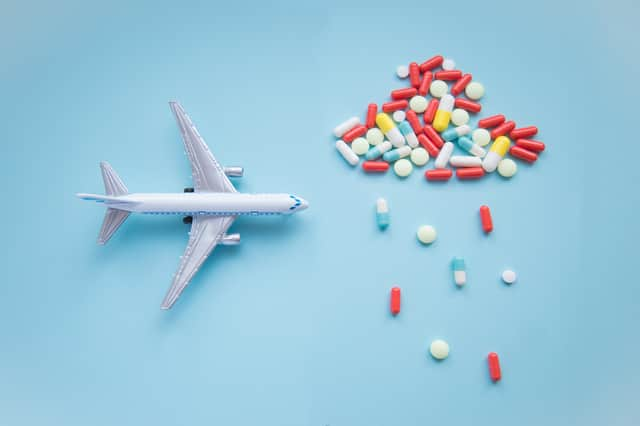These are the rules about flying with medication and medical equipment


This article contains affiliate links. We may earn a small commission on items purchased through this article, but that does not affect our editorial judgement.
With recent headlines detailing how one traveller was forced to choose between her luggage and her medical equipment by EasyJet, some holiday goers might be left wondering what the rules and regulations are when flying with medication or medical equipment.
This is everything you need to know before you start packing your bags.
Advertisement
Hide AdAdvertisement
Hide AdFlying with medication and medical equipment
Firstly, you’ll need to check the rules of the country you’re travelling to regarding their regulations about the types of medication they allow to be taken into the country and the maximum quantity you can take in.
International rules can vary, so you should contact the embassy for the country you’re visiting - the GOV.UK website has a full list of foreign embassies in the UK that you can check out online here.
If you’re travelling with medication, the NHS has compiled a checklist of things to think about before you set off.
This includes:
Always carry your medicine and equipment (needles, syringes, etc) in their original and correctly labelled packages, and with a copy of your prescriptionPacking a spare supply of your medication in your suitcase in case you lose your hand luggageBeing aware if you need to keep your medicine at a specific temperature, and if it does, think about storing it using a thermos flask, ice pack or cool bagChecking to see if you need a personal licence to take controlled medicines abroad, which you can check via the government website here
Advertisement
Hide AdAdvertisement
Hide AdYou’ll also need to check the regulations of the airline you’re travelling with as well.
Ryanair
Ryanair requires a medical equipment baggage waiver letter to carry any medical equipment onboard a Ryanair flight.
The Ryanair website states, “Passengers with pre-existing medical conditions who need to carry medical equipment in addition to their checked/hand baggage allowance must contact our Special Assistance Line well in advance of travel.”
You can contact the Special Assistance line either via live chat online here or by phoning the dedicated number 02032856488.
Advertisement
Hide AdAdvertisement
Hide AdThe special assistance team will be able to determine whether or not your request can be approved.
It continues to explain that upon the provision of a doctor’s letter confirming your requirements, a medical equipment baggage waiver letter will be issued.
Items listed in the waiver letter will be accepted on the carriage free of charge. These items will need to be packed separately and be available for inspection at the airport.
“Certain items such as Portable Oxygen Concentrators (POC ) that meet regulatory requirements are approved for onboard use. Other medical equipment such as a CPAP or Portable Dialysis machine can be carried but not used onboard,” the website explains.
Advertisement
Hide AdAdvertisement
Hide Ad“Passengers are permitted to carry syringes in the aircraft cabin, if they are needed for medical reasons (for example a diabetic passenger). However, passengers should carry a doctor's letter confirming their requirements.”
EasyJet
The EasyJet website states, “If you’re putting medicines in your hold luggage, you must pack them separately from any other items and provide a doctor’s certificate confirming that you need them while you’re away from home.”
It goes on to explain that you are allowed to bring any medicines and medical equipment that you need to have with you, and that includes things like gel packs or cooler bags to maintain the correct temperature for your medication, food and specialist devices.
When bringing medicine on board, you must provide a doctor’s note confirming the type of medication and what it’s used for. The doctor’s certificate will also allow you to bring liquid medicines larger than 100ml through security.
Advertisement
Hide AdAdvertisement
Hide Ad